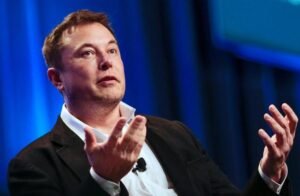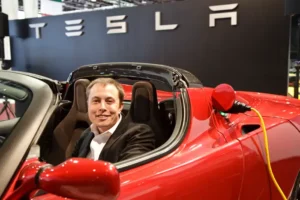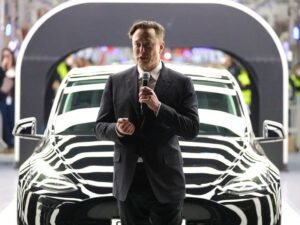During a whirlwind trip to Beijing that concluded on Monday, Elon Musk advocated for China’s approval for Tesla to introduce advanced driver-assistance systems. This move comes at a critical juncture for Tesla, as it faces increasing competition from Chinese rivals.
Elon Musk, the CEO of Tesla, arrived in the Chinese capital on Sunday, with discussions centered around the rollout of Full Self-Driving (FSD) software and the authorisation to transfer driving data overseas, as per a knowledgeable source.
Among his engagements was a meeting with Chinese Premier Li Qiang, who commended Tesla’s progress in China as a successful model of economic and trade collaboration between the U.S. and China. However, state media did not specify whether the discussions with Li Qiang included the topic of FSD.
Honored to meet with Premier Li Qiang.
We have known each other now for many years, since early Shanghai days. pic.twitter.com/JCnv6MbZ6W
— Elon Musk (@elonmusk) April 28, 2024
Top successful agendas of Musk
During his recent trip to China, Elon Musk and Tesla received a significant endorsement from a top Chinese auto association. This endorsement confirmed that Tesla’s Model 3 and Y cars meet China’s stringent data security requirements. Additionally, sources disclosed to Reuters that Tesla has struck a deal with Baidu, a leading Chinese tech company, allowing Tesla to utilise Baidu’s mapping license for data collection on Chinese public roads. This collaboration is seen as a crucial step towards introducing Full Self-Driving (FSD) technology in China.

The positive developments were reflected in Tesla’s stock, which saw a 7% increase in premarket trading. However, data security and compliance issues have been obstacles for Tesla in fully implementing FSD in China, despite strong demand from customers in this important market. Despite rolling out the most advanced version of its Autopilot software four years ago, Tesla has yet to make FSD fully available in China due to these challenges.
Elon Musk and Tesla received a significant boost
During his recent visit to China, Elon Musk and Tesla received a significant boost, a top Chinese auto association endorsed Tesla’s Model 3 and Y cars for complying with China’s strict data security regulations. Additionally, according to sources speaking to Reuters, Tesla reached an agreement with Baidu, a prominent Chinese tech company, to utilise Baidu’s mapping license for collecting data on China’s public roads. This collaboration is seen as a crucial step towards introducing Full Self-Driving (FSD) technology in China.
The positive news led to a 7% increase in Tesla’s shares during premarket trading. Despite strong demand from customers in China, data security and compliance issues have hindered Tesla from fully implementing FSD in the country. Despite being a pioneer in autonomous technology with its Autopilot software, Tesla has faced challenges in making FSD fully available in China, its second-largest market globally.

Since 2021, Chinese regulators have mandated that Tesla store all data gathered by its Chinese fleet in Shanghai, prohibiting the company from transferring any data back to the United States. Elon Musk aims to secure approval to transfer data collected in China overseas for the purpose of training algorithms for its autonomous driving technologies, according to an anonymous source.
Musk’s unpublicised visit to China, initially reported by Reuters, was not officially announced, and the individual sharing this information did so anonymously due to lack of authorisation to speak with the media.
The aircraft transporting Musk departed from Beijing Capital Airport and was bound for Anchorage, Alaska. Tesla has not yet responded to inquiries regarding Musk’s departure.
It’s still uncertain what additional regulatory approvals Tesla will require, if any, or what conditions the company must fulfill before making Full Self-Driving (FSD) technology fully available in China.
Elon Musk’s unexpected visit to China marks a significant milestone for Tesla
According to Wedbush equity analysts, Elon Musk’s unexpected visit to China marks a significant milestone for Tesla. Meanwhile, rival Chinese automakers and suppliers like Peng and Huawei Technologies are striving to outpace Tesla by introducing similar software.
Hu Xijin, a former editor of the state-backed tabloid Global Times known for supporting China’s official stance, commented on his Weibo account that Tesla is the sole foreign-funded automaker to meet China’s data compliance standards. He also noted that this achievement would pave the way for Tesla vehicles to access premises owned by government agencies and state-owned enterprises throughout China.
 “This marks not only a milestone in China but also presents a notable example for the global community in addressing data security concerns,” he remarked.
“This marks not only a milestone in China but also presents a notable example for the global community in addressing data security concerns,” he remarked.
Musk’s visit occurred shortly after he canceled a scheduled trip to India to meet with Prime Minister Narendra Modi, citing “significant Tesla commitments.”
Originally, Musk had intended to announce investments ranging from $2 billion to $3 billion during his visit to India, including plans for a new car plant. This decision came after India proposed reduced import taxes on electric vehicles (EVs) as part of a new policy.
For years, Tesla cars have faced bans from entering Chinese military complexes due to concerns about the cameras installed in the vehicles. They’ve also been denied access to important political events locations, like the ruling Communist Party’s annual summer leadership conclave in 2022.
He Xiaopeng, CEO of XPeng, whose XNGP Advanced Driver Assistance System resembles Tesla’s Full Self-Driving (FSD) technology, expressed his support for Tesla’s technology entering the Chinese market on his Weibo account.
The possibility of FSD being introduced in China has improved, coinciding with a decline in Tesla’s stock value by almost a third since the beginning of the year. Concerns about Tesla’s growth prospects have been growing, highlighted by the company’s recent report of its first quarterly revenue decline since 2020, when the COVID-19 pandemic impacted production and deliveries.
Elon Musk announced plans to introduce new, more affordable models using existing EV platforms and production lines. He also mentioned the launch of a new “robotaxi” equipped with self-driving technology, which he plans to unveil on August 8th.












Comments 1